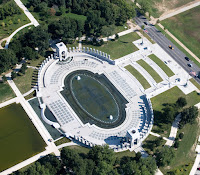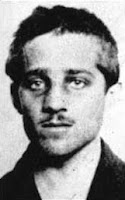"Lost" but not Forgotten
“Every day, in every way, I’m getting better and better.”
The introduction to chapter 20 of my World History book, the
chapter on World War I, uses these words to describe the mindset of folks
going about their lives just before the outbreak of the Great War. Émile Coué, a French
psychologist at the beginning of the 20th century, had his patients say
the above phrase over and over in order to propel themselves to self-healing. A
similar belief to Coué’s mantra permeated Western thinking at the
time. The booming progress of the 19th century had caused the
standard of living of many to rise. Scientific and technological discoveries
made life easier, and advances in medicine had helped to cure or eradicate many
of the diseases which had devastated the populations of the world. Truly, the
world seemed to be getting “better and better” every day.
 |
| Palace of Nations in Geneva - Headquarters of the failed League of Nations |
Then right smack dab in the middle of 1914, a child barely
out of diapers (ok, so he was 19…old enough to know better) committed an act
that would turn the world upside down and plunge it into a war that was the
most devastating seen up until that point. When it was finally over, that
generation figured it could never happen again. They had learned their lesson
and took impotent “drastic” measures to ensure it would never happen
again. If you know anything about 20th century history, you might
laugh at their idealistic naiveté. Or maybe not since this is no
laughing matter. Unfortunately, the “War to End All Wars” was only the beginning
of a long string of wars and struggles that continues to grow longer even today.
The other day I was watching a British comedy about a grumpy
country doctor whose aunt was concerned that her friend was possibly getting
dementia or Alzheimers. Doc goes to see the old lady, asks her several random questions.
I don’t remember any of them except for the last one. When did World War II
start, he asks. When she answers November 11, 1918, Doc and his aunt share a
concerned glance. (November 11, 1918, was the day of the armistice to
end WWI.) But then the lady goes on to explain her vast understanding of how
the extremely unfair and punitive terms of the Treaty of Versailles led to
nearly two decades of German struggle and unrest, which ultimately culminated
in the Second World War, the devastation of which would cause the first war to be
mostly forgotten.
It sort of reminds me of I Thessalonians 5:3. The verse goes like this, "While people are saying, 'Peace and safety,' destruction will come on them suddenly, as labor pains on a pregnant woman, and they will not escape." (NIV) While everything was getting better and better, a world war shatters the peace. While it was the war to end all wars, and measures were taken afterward, such as the formation of the League of Nations and the gathering at the Washington Naval Conference, to ensure "peace and safety," some of the very measures taken to ensure peace would lead to another world war in under 20 years. Just long enough for the children of the first war to come of age to fight in the second.
 |
| aerial view of the WWII Memorial in DC. |
Crumbling.
Dirty.
Forgotten.
 |
| The DC WWI Memorial which has fortunately been restored. (This is not one of the pictures we took. I borrowed one from the site for the move mentioned below.) |
My eyes filled with tears when I realized what it was. And I
was oddly annoyed that we got so many good shots with no strangers milling
about in the background. Usually I grumble and complain (mentally, not out
loud) that I can’t seem to get good shots of the places we visit because
there are too many stinking tourists (like me) in the way. But not this time.
No one else was there.
Forgotten.
 |
| Korean War Memorial |
Korea has been given the distinction of being the forgotten
war, but even that one got a pretty nice national memorial while the truly
forgotten “Forgotten War,” as far as I know, still doesn’t have one. (Just to
be clear, I’m not saying Korea doesn’t deserve one. My father was a veteran of
that war. I’m saying WWI needs one, too.) What we happened upon was
actually a DC specific memorial commemorating DC residents who died in the war.
 |
| Iwo Jima Memorial |
The generation of WWII has been called “the Greatest
Generation”. A well deserved honor, for truly they were great. I don’t think
many people my age and younger, as well as a majority of the baby boomers, have
any idea what the Greatest Generation sacrificed. I used to chafe at being
called Generation X. There’s a certain chuckle-worthy ring to Baby Boomers,
nobility in being The Greatest, and Millenials sounds so…futuristic and full of hope. But Generation
X seemed a vague, faceless term to describe the youth of the colorful 80s. But
hey, at least we weren’t lost. That’s the term used for the WWI generation. A scan
through of the emptiness of the following decade, the “Roaring 20s,” is a good
indication of just how appropriate that appellation was. But they didn’t start
out that way. After all, every day in every way they were getting better and better.
 |
| Gavrilo Princip |
I’m not a psychologist, but I have my theory about why that
sad name is so fitting. Like the proverbial ostrich with his head in the sand,
the people of the early 20th century were turning a blind eye to the great seas
of boiling magma beneath the emotional surface of Europe and the western world.
Neo-colonialism; liberty movements of the early and mid 19th
centuries, some resolved, some not; extreme nationalism spawned by those same liberty
movements, especially the unresolved ones; and the distrust of each other among
the European nations which caused some conventional and some not so
conventional alliances to be formed. This conglomerate of problems would rumble
on June 28, 1914, when 19-year-old Serbian “freedom fighter,” Gavrilo Princip, and his buddies took matters into their own hands and assassinated the one man
who might have been their greatest ally. It is said that the Archduke had plans
to give more independence to Serbia once he had assumed the throne of the
Austro-Hungarian empire. There is no telling if that was just a campaign
promise that would be ultimately broken, as is the case with most politicians. We
will never know since even the option was violently taken away from Franz
Ferdinand by an assassin's bullet.
The volcano rumbled and spat for weeks, then finally exploded
a month to the day later on July 28. The world, which had been ambling happily out
of the 19th century, was rudely thrust into the tumultuous 20th. One historian put it very succinctly when she said that the men and
women of WWI galloped on horseback into the war, and those that survived flew home in
airplanes. It’s a war that, more than any other conflict before it or, in my
humble opinion, afterward, changed forever the political and emotional landscape of the
world.
 |
| Frank Buckles in 1917 |
For better or for worse, today, 101 years ago, the Lost
Generation began to fight their way into a new and modern era. We can no longer
thank the American veterans of WWI for their service. The last one, Frank
Buckles, died in 2011 at the age of 110. He fought for but never saw the
fruition of a national memorial to the sacrifices he and his buddies made. But
other memorials have been made, including a movie about Mr. Buckles’ life. I
haven’t seen it, but I would like to. It’s titled Pershing's Last Patriot.
The push continues for the memorial, which tells me something. Lost...maybe,
but not forgotten. At least, not as long as we continue to remember and honor
them for their sacrifices.
Comments